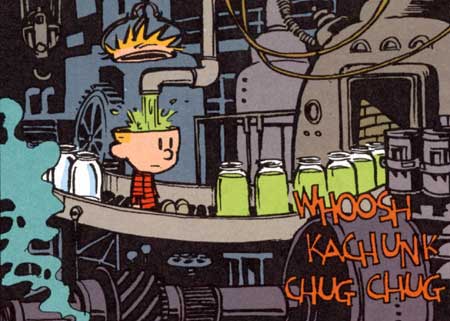Do We Really Need Schools?
Kaspar Hauser was a kid with a curious history. He spent first years of his life imprisoned in a dark cell, feeding only on bread and water. On this first period, he had any contact with any person and, even less, with the whole world surrounding the walls that bound him.
At any given moment, the boy was set free and, because of the years in confinement, discovered the world without any kind of knowledge. Without life experience and without having at least one language to comunicate, the boy learned his first words and, lately, started to talk, just like a child starts to living.
His apparition was in Nuremberg, Germany, supposedly with 15 years old, with a letter addressed to the captain of the city, asking to be a knight, like his father. Further on, Kaspar shows himself to be a very intelligent person, with aptitudes for music, knitting and gardening.
Mas that did not stop the boy from being seen as strange and wild, just because of the simple fact that he couldn't understand and participate of the social conventions of the time. There was, at the time, rumours that he could be of the german nobility. Kaspar had talent, noble blood, but none of this helped him to overcome years of isolation.
Source: The Enigma of Kaspar Hauser
Do We Need Schools?
Schools come in the most varied sizes and formats. You may have frequented a tradicional institution, humanist, democratic or constructivist. A rich or a poor. You may love or hated. If you have children, or when you have, would like them to study in the same school? But it doens't matter.
I do not want, in this context, compare the different pedagocical approaches, but a very central foundation of the current model of education: the very existence of schools.
Do we need them?
The Task of Education
School and education are two different things. The younger generations are received by the people who have been around longer and are it is our task to introduce them to lfe and the world, try to offer a good idea of how things work and what to expect on sunday mornings.
Afterall, we were not born human. We depend on human environments, social relations and the culturally organized affective bonds to humanize ourselves. Without that, we are Kaspar Hauser. The process of integral formation of a human being, in its various dimensions, this is education.
The Invention of the School
This being the major task, in contrast, the school emerges as a strategy. Only very recently in the history of civilization, including, the teaching/learning process now has a specific place for this, a closed institution, whose objective is to exclusively keep the young dedicated to studies. Throughout most of history, people learned the things of life in life itself.
There are places that have doors for people not to enter, like cinemas, theaters and football stadiums; and there are place that have doors for people not to leave: such as penitentiaries, hospices and schools.
If education is "what we should learn" and school is "how we should learn", I present a central argument: it is a bad strategy for education to get people out of the exact place they should learn (the world) and places them in a distant environment, virtual (the school). Let us examine the fundamental logic of the system.
We withdraw the children and young people of the world so that they can study... the world?
We deprive our children of everyday life as a way to prepare them for... life?
This is equivalent to training a swimmers looking to keep him away from the pool.
Inherent Difficulties
Schooling, therefore, shuffles means and ends. That doesn't mean that there are no good schools. The problem is the logic of the thing.
Although there are good schools, they can not get rid of this basic contradiction and end up having to deal with difficulties generated by the system itself.
For example: children are being clogged with medicines because they do not stop. What we should ask ourselves: would be that, for their sake, they should learn to be still for hours on end, days, weeks, months, years, in classrooms trying to absorb a multitude of contents that generally do not make sense (because they have little to do with their immediate reality and because they are not very useful) - while life happens out there? Is that a sign of health?
Being education a broader phenomenon, we understand schooling as the institutionalization, bureaucratization and massification of vital processes linked to the discovery of the world. Is to get something alive, fluid and pulsing and box it.
Knocking Down The Walls
What happens if we open the gates, if we break down the walls? The city, the community and the networks (physical or digital) will be the school. Instead of a single path for everyone, each person can take a life in their own hands and undertake their own formation at their own pace, driven mainly by their interests and inclinations. So that you can write and live your own life, not the life someone has planned for you.
Utopia? Let's see!
City-school
We have never had so many resources to enable this decentralized model of education. Big cities can offer extraordinary learning opportunities. Sites publish, every day, a list of services offered free or at popular prices. Courses and lectures, exhibitions, cinema, theater, shows, performances, urban interventions. All for free or cheap.
Contrasts
Returning and reinforcing: it is to be convinced that the current model of education (which was conceived over a historical period of radically distinct characteristics) collapsed. Signs from school environments are unmistakable: suffering, illness, psychiatric leave of educators, bullying, outbursts of violence, invented disorders and large-scale medication.
We don't need no education... All in all you're just another brick in the wall
Internet-school
In addition to the psysical resources, perhaps the most impressive is the personal development and transformation potential available to those who have access to the internet.
It is no exaggeration to state the quantity and quality of the materials available online.
They are free, open universities, documentaries and fiction films, digital books, encyclopedias, maps and historical documents, classes and demonstrations, photos, music, in addition to interactions in social networks, collaborative processes and the emergence of collective intelligences. Not to mention what is being added to the network every day.
It is a waste to keep children and adolescents confined when they could enjoy what the city and the network offer. People do not have time to explore the city itself, or the inexhaustible universe of the world wide web, because they need to study for the next test, finish homework or answer the call somewhere.
In contrast, there are Wikipedia, MIT Open Course Ware, TED and TED Ed and Khan Academy. They are reservoirs of growth and learning experiences that are impossible to exploit whitin the narrow confines of classrooms, in groups that need to function in a homogeneous way, led by overtaxed and discouraged teachers. Staying at school is a waste of time and children (and especially teenagers) are incresingly aware of this.
A New Professional: The Curator Educator
In an open, system-actor model dedicated to reproducing the status quo, the education professional moves to the creative role of mentor, curator, or inspirer of maturing and training processes. Since, today, the problem is no longe the access to knowledge and becomes the excess of options, the role of the educator fundamentally involves the skills:
To help the learner to get in touch with his inclinations (with his heart, with his truth, with his interiority), approprating his desires, conflicts and contradictions. Give birth to individuality.
To point out rugged trails, slippery terrain and dead ends, and to select, from the vast ocean of possibilities, favorable directions for the realization of their unique potential and their deepest aspirations.
Therefore, the teacher should establish a closer, authentic and personal relationship with the learner in comparison with the institutionalized, fragmented and authoritarian teacher-student relationships of the school series and disciplines in the current system.
This model, which relativizes the hegemony of the formal education system and seeks consistent alternatives of human (and not just cognitive/intellectual) formation, which permeates life and culture (and not only in academy and the labor market), is a relaity emerging, bubbling, and will be designed by the bold people who see and take the first steps. The time is now.
If you've read this far, thank you!

